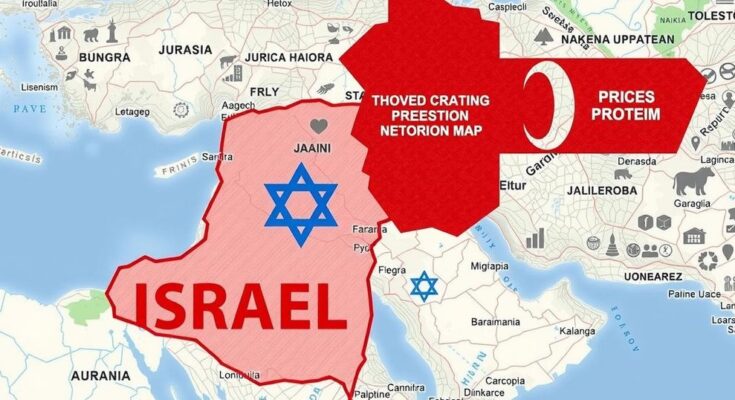Israel’s recent social media post of a map claiming historical territorial rights has ignited international backlash, leading several Arab states to condemn what they perceive as expansionist efforts. The map encompasses areas of Palestine, Jordan, Lebanon, and Syria, leading to calls for action against Israel’s territorial claims from Jordan, Qatar, and the UAE.
A significant diplomatic controversy has emerged as the Israeli Ministry of Foreign Affairs posted a new map claiming historical rights over territories in Palestine and parts of Jordan, Lebanon, and Syria. This map, presented on its Arabic-language social media accounts, has been met with widespread condemnation from various Arab nations. These nations argue that the map is an assertion of expansionism, depicting what is referred to as “Greater Israel,” which they assert includes occupied Palestinian territories.
The contentious post claims that Israel, referred to as a Jewish state, was established 3,000 years ago. It portrays a biblical narrative of Israel’s kings: Saul, David, and Solomon, whose reigns collectively lasted 120 years and significantly shaped the history of the Jewish presence in the region. Alongside the claim of historical rights, the Ministry emphasized Israel’s declaration as the only democracy in the Middle East since 1948. Jordan, alongside Qatar and the UAE, has decried this portrayal, viewing it as a blatant violation of sovereignty and a hindrance to the establishment of an independent Palestinian state.
The uproar was underscored by the strong reactions from Jordan’s Ministry of Foreign Affairs, which labeled the Israeli claims as “accusations and confusion” intended to obstruct Palestinian statehood. Similarly, the Ministry of Foreign Affairs from Qatar termed the map a “blatant violation” of international norms, urging the international community to act against Israel’s expansionist tendencies. The UAE also issued a condemnation, perceiving the map as a calculated effort to extend Israel’s occupation.
The posting of this controversial map has sparked a call for international action to counter perceived violations of international law and prevent further territorial claims by Israel, as articulated by multiple Arab states and Palestinian leaders, including Hamas. The escalating tensions surrounding this issue illustrate the complexities that continue to challenge peace efforts in the region.
Recent tensions between Israel and Arab nations have escalated due to the publication of a new map by Israel that claims significant territorial rights over Palestinian and adjacent Arab lands. The Israeli Ministry of Foreign Affairs presented this map on social media, asserting a biblical basis for Israel’s territorial claims and sparking outrage and condemnation from various Arab nations. This incident reflects ongoing conflicts regarding sovereignty, territorial integrity, and historical narratives surrounding the state of Israel and the Palestinian territories.
In summary, the release of Israel’s newly claimed map has ignited a diplomatic crisis, with several Arab nations expressing strong opposition and demanding international intervention against perceived territorial expansionism. Jordan, Qatar, and the UAE have condemned the map as a violation of sovereignty and international norms, indicating heightened regional tensions. This controversy underscores the complexities of Middle Eastern diplomacy and the ongoing struggle for Palestinian statehood.
Original Source: www.india.com




